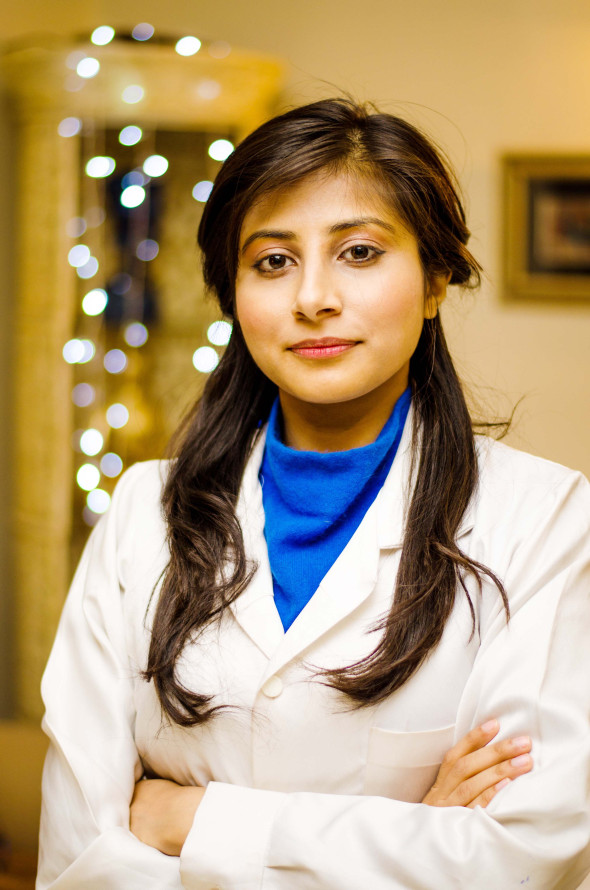Dr. Roop Zainab Rana and her father Professor Dr. Mowadat Hussain Rana, Sitara-e-Imtiaz, a leading light in the Pakistani psychiatric community, have proudly launched Pakistan’s first mental health club and day care centre called The Healing Triad on Islamabad’s picturesque Margalla Road.
The Healing Triad is the first of its kind mental wellness center in Pakistan. The institute provides a holistic health environment for individuals challenged by stresses of modern life. In addition the mental health club also provides counseling and workshops aimed at improving quality of life in the community at large, and introducing healthy lifestyles. Healing through a triad of medical, psychological and social interventions, the centre also focuses on the economic emancipation of the mentally challenged, striving to help these individuals realise their full potential. Talking to Blue Chip magazine, Dr. Roop Zainab reflected on how this initiative will to dilute the stigma associated with mental health issues.
The Healing Triad emerged from the needs of not just the patients but their families as well. Can you give us more insight into the basis for this institution?
Dr. Roop Zainab: “My father, Professor Dr. Mowadat Rana, has a very successful psychiatry practice that I have been a part of for the last two years. We see numerous patients with all sorts of psychiatric morbidities and the common trend among almost all these patients is that their chronic illnesses significantly affect not just their own lives but those of their family members, as well as anyone who regularly interacts with them. Caregivers end up having little to no time for themselves and their lives start revolving around that one person with the disability.
I’ve seen this play out a number of times in my own patients and their families. Many of my patients have one or more family members that take care of them. Often their lives are driven by the needs of the sick person and they end up neglecting their work and personal needs. I’ve had patients that are not sick enough to be admitted into a hospital and not well enough to be checked upon through a weekly appointment. This leaves a void that family members with little or no medical or psychiatric training have to fill.
We decided to establish The Healing Triad to address this need. We aim to provide professional care in a pleasant home like environment that caters to the specific therapeutic and personal needs of our clients and club members.”
The Triad has special significance particularly to the model of care you provide. Can you elaborate?
RS: “The Triad actually refers to the bio-psycho-social model of care that we provide. At one level bio refers to the physical and biological aspects of care, psychological refers to the mental and psychological aspects of care and social to the social component necessary for wellness. At another level the significance of family forms the integral the third part in the interaction between the patient and doctor. In this triad rests the holistic model of care.
In establishing The Healing Triad we have focused on addressing aspects of mental health care that are often overlooked. Our model of care allows people with mental disabilities to live full lives. We believe this can happen not just by focusing on the patients but on society as a whole. For these reason The Healing Triad has three guiding principles: destigmatisation, therapeutics and reintegration of the individual into society.
Our destigmatisation campaign focuses on reducing the stigma of mental illness, that arises from a combination of misinformation and lack of awareness about mental health issues in society. For instance, while physical ailments like diabetes are easy to understand, comprehending depression as an illness is very hard for the layman. As part of our destigmatisation campaign we are conducting awareness campaigns in schools. We provide children information about common disorders and encourage them to spend some time with our clients to help them dispel the strange notions society perpetuates with regard to mental illness.
The second principle focuses on re-introducing these individuals as productive parts of society. People suffering from mental illnesses may not be able to contribute to the household and act as impediments in their caregivers’ professional and personal objectives. We aim to teach them skills that help them to become earners and contribute towards the household. We have jewellery designers, famous chefs, renowned writers, economists, artists, musicians, crafts people, yoga instructors and professional seamstresses, all who have donated their time to teach our clients whatever they may choose to learn. We are currently in the process of contacting multinationals companies that have social responsibility programs to help us, not in terms of money, but in terms of giving our patients tasks that they can easily manage and get paid. In our experience the sense of empowerment associated with earning helps improves a person’s sense of self-worth and helps the overall rehabilitation and reintegration process.”
The third aspect is therapeutic. We have group-therapy sessions in the morning run by our team of psychologists and psychotherapist, psychiatric nurses who ensure that clients take their medication and monitor their health status and an award winning team of psychiatrists to monitor their progress.
What motivated you to establish The Healing Triad?
RS: “It was something that my father and I had been thinking about this niche for a day care centre and a mental health club for quite some time. My parents had been fancying this triangle shaped house on Margalla for many years now. When it recently became available, it occurred to us that this place with its triangular shape was an embodiment of the kind of care we wanted to provide our clients. So in many ways this house inspired us to start The Healing Triad.”
Can you give us more insight as to what encouraged you to step into this field?
RS: “My father is world-renowned psychiatrist and I grew up with a reverence for what he did and how he improved the lives of everyone he came into contact with. I was six years old when I first wrote an essay about wanting to grow up to be a psychiatrist, and I remember my teacher appearing confused as to what that was, and thinking to myself, I need to change that. The only other speciality I fancied was surgery and what really tipped the scale for me though were my experiences during my housejob . I was working in surgery with some of the most brilliant surgeons in the country. I enjoyed it immensely but at the same time I also felt that it was more skill based and wasn’t really providing me the intellectual stimulation that I was looking for. When I started working in psychiatry, I realised that even though two appendectomies could be similar, two patients in psychiatry could never be the same because two human minds are never the same.”
The Healing Triad particularly focuses upon destigmatisation of individuals with mental illnesses. What can we, as a society, do to reduce this stigma?
RS: “I think what your article will be doing is just what is required: spreading awareness. Mental, neurological and substance (MNS) disorders account for 22.9% of the years lived with disability globally Depression is the second leading cause of disability worldwide, and affects 121 million people. Severe depression is responsible for 850,000 deaths every year, so this isn’t something that’s happening to someone else, somewhere else any more. We hold the concept of our sanity so close to our hearts that if anything so much as insinuates that something is wrong or threatening it, we panic or go into denial. One of my clients suffering from clinical depression would tell me that everyone would ask her what sort of a disease is it where you don’t feel like getting out of bed or doing anything or taking interest in anything. She was accused of being lazy, a malingering ‘drama’. My response to that was that one was unaware of what fever or a cough was, they’d question what kind of illness made your body heat up and made you want to clear your throat repeatedly.
We conduct a medical camp we put up every year in my village near Sahiwal. Nearly 1500 patients with all kinds of physical and psychological issues are treated by various specialists . During this, we also now try to screen people for psychiatric illnesses as many of these people have vague aches and pains in their bodies, attributable, among other things, to anxiety and depression.
Fortunately, we have now reached a point in science where we have broken down the causes of mental illnesses into fairly accurate components. We now know what chemical imbalances in our brains can bring about a resultant mood and personality change. There’s still the need for a great deal of research but there’s too wide a chasm between what scientists know about the mind and how laymen understand the way the brain works. People could become more comfortable with the idea that clinical depression simply means that the neurotransmitter aka the ‘happy’ chemical in your brain is low, and taking a pill could bring it to its appropriate level. A majority of psychiatric morbidities are now known to have a special biochemical basis just like diabetes or any other of the “socially acceptable” illnesses.
This kind of attitude is exactly why the destigmatisation campaign is a vital part of our project. We need to create awareness, not just for those who are already significantly affected but for those who are too afraid to go in and see a doctor in the first place. We encourage people to visit us and just get to know more about these ‘taboo illnesses’.”
What are the future plans for The Healing Triad?
RS: “We’re still a very young company, but what we do hope for is to be able to make a paradigm shift in the way we, as a society, view mental health and the lack thereof and care for those who remain, sadly, still uncared for.”







